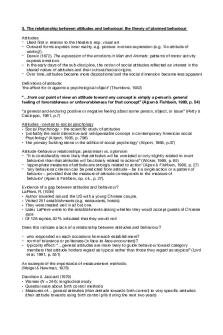What is the relationship between theory and research PDF

| Title | What is the relationship between theory and research |
|---|---|
| Author | marcus zzz |
| Course | Sociology and Social Policy |
| Institution | University of Chester |
| Pages | 2 |
| File Size | 72.1 KB |
| File Type | |
| Total Downloads | 14 |
| Total Views | 140 |
Summary
What is the relationship between theory and research...
Description
What is the relationship between theory and research? Theory and Research Sociological research often gains significance in relation to the theoretical concerns it engages with. ‘Naive empiricism’ – negative term used to describe research that is merely descriptive and doesn’t make a connection with theory. Theory – “A set of ideas or related concepts which can be used to explain and understand an event, situation, social phenomena” (Matthews & Ross, 2010). “Grand” versus “middle-range” theories Courses in sociological theory (e.g. History of Sociological Thought) tend to focus on ‘grand’ or ‘macro’ theories – high level of abstraction (interactionism, functionalism, feminism, critical theory etc.) Too vague and difficult to apply in specific contexts. Thus most theories directly connected to social research tend to be ‘middle-range’ or ‘meso’ theories, relevant to a specific domain e.g., ‘labelling theory’ in the sociology of deviance or ‘cultural capital’ in the sociology of education. Research and theory: an example Willis, Learning to Labour. Part I: ethnography. Extensive observation, unstructured interviews. ‘Thick description’. Lots of direct quotes, etc. Part II: analytical/theoretical contribution – counter-school subcultures (‘meso’) (from a broadly Marxist perspective (‘macro’)). Did the theory drive the ethnography or did the ethnography drive the theory? Deduction Typically associated with scientific investigation. Hypotheses (i.e. an explanation between two or more variables that predicts an outcome or explains a phenomenon) are proposed and tested. E.g. Regularly attending lectures/seminars increases the likelihood of achieving high grades. Induction Here theory is the outcome of research – you gather data, look for patterns, then develop a theory. The inductive stance is particularly prevalent in the methodological approach known as grounded theory. Developed in the 1960s as a reaction against the prevalent tendency to base research either on quantitative methods or around a small selection of grand theories (Marx, Durkheim, Weber). Theoretical assumptions should be avoided in order to allow patterns to emerge from the data The data is analysed and any emerging patterns can be further explored with more targeted research – leading to more data and more analysis “The emerging theory points to the next steps – the sociologist does not know them until he is guided by emerging gaps in his theory and by research questions suggested by previous answers” (Glaser and Strauss). Deduction and Induction (tendencies)
Deductive strategies are generally associated with quantitative approaches, and inductive ones with qualitative approaches. However, in reality, research design and implementation is rarely clear cut. E.g., not all qualitative research generates theory (indeed theory often provides a background to qualitative research). And can we ever gather untainted data if we already have a theory or hypothesis in mind?...
Similar Free PDFs

What is legal research?
- 3 Pages
Popular Institutions
- Tinajero National High School - Annex
- Politeknik Caltex Riau
- Yokohama City University
- SGT University
- University of Al-Qadisiyah
- Divine Word College of Vigan
- Techniek College Rotterdam
- Universidade de Santiago
- Universiti Teknologi MARA Cawangan Johor Kampus Pasir Gudang
- Poltekkes Kemenkes Yogyakarta
- Baguio City National High School
- Colegio san marcos
- preparatoria uno
- Centro de Bachillerato Tecnológico Industrial y de Servicios No. 107
- Dalian Maritime University
- Quang Trung Secondary School
- Colegio Tecnológico en Informática
- Corporación Regional de Educación Superior
- Grupo CEDVA
- Dar Al Uloom University
- Centro de Estudios Preuniversitarios de la Universidad Nacional de Ingeniería
- 上智大学
- Aakash International School, Nuna Majara
- San Felipe Neri Catholic School
- Kang Chiao International School - New Taipei City
- Misamis Occidental National High School
- Institución Educativa Escuela Normal Juan Ladrilleros
- Kolehiyo ng Pantukan
- Batanes State College
- Instituto Continental
- Sekolah Menengah Kejuruan Kesehatan Kaltara (Tarakan)
- Colegio de La Inmaculada Concepcion - Cebu














